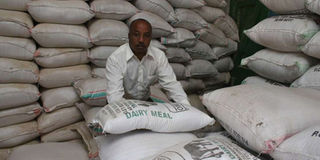Feedback: What it takes to start feeds store

It is important to have knowledge on animal nutrition and health to manage in the animal feed sector. FILE PHOTO | NMG
What you need to know:
- It is important to have knowledge on animal nutrition and health to manage such a sector.
- Cows must calve to produce milk and the lactation cycle is the period between one calving and the next.
- Watermelons are warm season crops and they require long growing season of high temperatures. Good vegetative growth requires 18-32oC, the optimal being 18-24oC.
- Use of sprinkler irrigation raises the humidity within the canopy and this leads to increased disease incidences. Weeds should be controlled, especially when the melon plants are young.
I WANT TO START A FEEDS STORE
I am a pig farmer in Kamulu, off Kangundo Road. I want to start an animal feeds store, selling feed raw materials and stock credible millers products. I also hope to provide farmers with animal nutrition and health information.
It is important to have knowledge on animal nutrition and health to manage such a sector. Ensure that you have a reliable supplier of raw materials; don’t compromise on the quality of raw materials; be honest to people working for you; get all the licences required to start such a business; get cleared by Kebs; have an understanding of the nutrient composition in the raw materials; put your store in a safe place; always keep up with emerging alternative raw materials and don’t shy to continuously update yourself and consult on new information about animal nutrition and health.
Organise farmers’ day or attend one to reach out to farmers.
Dennis Kigiri,
Department of Animal Science,
Egerton University.
****
FRUIT FLY TRAPS
I’m looking for fruit fly traps but they are not available in Mombasa. Any contact from where I can get them?
Padoanello Elisa, Mombasa
Please contact Kenya Biologics Ltd through 0704652032 or 0713088551. You can also reach Samuel Kagumba of Farmtrack Consulting Ltd on 0722466834 or 0711495522.
Carol Mutua,
Department of Crops, Horticulture and Soils, Egerton University.
****
OUR COWS TAKE LONG TO CONCEIVE
I have a challenge with our dairy cows. We thought they were calving but we were told that they were not pregnant except one.

A farmer feeds his dairy cows. Cows can be infertile because of abnormalities of the ovaries, oviducts, uterus, cervix, vagina and vulva among other reasons. FILE PHOTO | NMG
We continued milking them but have witnessed that the milk is no longer fit for consumption because it is thick, then it gets spoilt. We were told that it is because the cows have taken too long to be pregnant. What could be the problem?
Naomi
Cows must calve to produce milk and the lactation cycle is the period between one calving and the next. The cycle is split into four phases, the early, mid and late lactation and the dry period (which should last as long as 65 days).
In an ideal situation, cows calve every 12 months. Don’t milk during the dry period. Cows can be infertile because of abnormalities of the ovaries, oviducts, uterus, cervix, vagina and vulva; cystic ovaries and retained (persistent) corpora lutea, high ambient temperature, high parasite burdens and disease, subfertile bulls, endocrine problems, malnutrition, reproductive tract infections and poor management, bacterial and protozoan infections, viral infections, retained afterbirth, endometritis, metritis and pyometra.
Dennis Kigiri,
Department of Animal Science, Egerton University.
****
GROWING BEST WATERMELONS
I am from Mombasa and I would like to venture into watermelon farming in Kilifi. Any knowledge on watermelon farming will be highly appreciated. I am really tired of waiting for a salary every end month, and I would like to make more money.
John Makite, Zipy Boyani
Watermelons are warm season crops and they require long growing season of high temperatures. Good vegetative growth requires 18-32oC, the optimal being 18-24oC.
They do better with adequate water supply. Within a growing season, at least 400mm of moisture will be required. Soils should be well-drained and with good water-holding capacity. The pH should be 6.0-6.8. Watermelons have been grown successfully in sandy soils, where water supply is adequate.
However, the best soils are sandy loam or silt loam. Application of nitrogenous fertilisers is based on soil type. Soils with high organic matter require 80kg N/ha, while light soils require 140kg N/ha.
The nitrogen fertiliser should be applied and incorporated into the soil at planting time. Phosphorus and potassium applications are based on soil tests, and both should also be applied at the time of planting. The best melons are those raised under irrigation.

Watermelons are ready for harvesting in about 3 or 4 months and their maturity is indicated when the fruit gives off a hollow sound when tapped with knuckles. FILE PHOTO | NMG
Most of the soils under which the melons are grown are light, which requires frequent watering to maintain good growth. Depending on the environmental conditions, 450-600mm of water is required within a growing season. Water can be applied through drip or furrow irrigation.
Use of sprinkler irrigation raises the humidity within the canopy and this leads to increased disease incidences. Weeds should be controlled, especially when the melon plants are young.
Weeds offer greater competition by shading the melon plants. Weed control can be achieved by application of black plastic mulches, cultivation, and use of herbicides that are registered for use in melons. Pests and diseases should be controlled using the appropriate chemicals.
Watermelons are ready for harvesting in about 3 or 4 months. Maturity is indicated when the fruit gives off a hollow sound when tapped with knuckles. The fruit stem should be cut with a sharp knife rather than broken by hand.
Carol Mutua,
Department of Crops, Horticulture and Soils, Egerton University.





